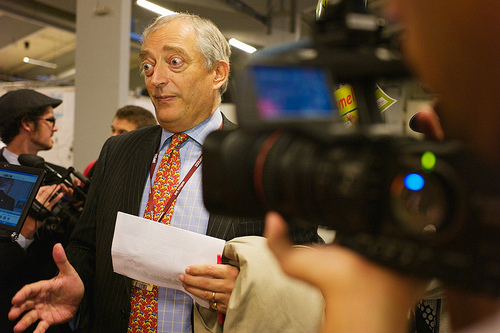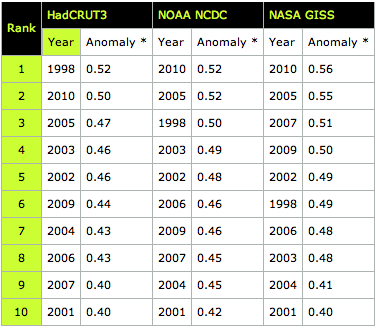 HIS choice of the Gershwin song “It Ain’t Necessarily So” was unfortunate, if not a little ironic.
HIS choice of the Gershwin song “It Ain’t Necessarily So” was unfortunate, if not a little ironic.
In an opinion article published in The Australian, professional climate change denier Christopher Monckton tried his hardest to convince readers that “thoughtful” politicians were beginning to ask “privately, quietly” if a supposed climate crisis was not “necessarily so”.
They were beginning to ask the “Gershwin question” mused Monckton, referring to the song in the 1935 musical Porgy and Bess – a song delivered, ironically, by the musical’s drug dealing character Sportin’ Life.
An addiction to a drug can be a terrible and debilitating experience and just as it is in the case of The Australian‘s apparent addiction to climate denial, it can be degrading, embarrassing and professionally damaging.
Christopher Monckton is one of the world’s most charismatic climate deniers, yet he has no qualifications at all in climate science. Among his beliefs are that the UN is attempting to create a world government and young climate campaigners are like Hitler youth. Others have also examined Monckton’s creative CV.
This lack of genuine expertise and tendency towards conspiracy theories don’t in themselves deny Monckton the right to an opinion, but the thrust of his views have been roundly rejected by practically every climate scientist currently researching and publishing in peer-reviewed journals.
Over and over, scientists working in the field and opening their own research to the rigours of peer review (which Monckton has never done) have gone to great lengths to debunk Monckton’s “analysis” of climate change (small selection of examples here, many here and here). They have explained his persistent misrepresentations and errors in calculations, but still Monckton repeats them and still – after alarm bells have been ringing for half a decade – The Australian provides him a forum.
It was possibly predictable that Monckton should appear in The Australian in January – they gave him a spin last January too (at the time Monckton was touring Australia and among others, received backing from mining billionaire Gina Rinehart). This time around, Monckton’s polemic comes as NASA confirms that 2010 tied with 2005 as the warmest year since records began.
The US National Oceanic and Atmospheric Administration also found 2010 to be tied with 2005 as the warmest year ever. 
The UK’s MetOffice found 2010 was the second hottest year on record, behind 1998.
In all three separate major records of global temperatures (shown in the table on the right with the anomaly being °C above long-term average), the ten warmest years on record have all occurred since 1998.
Yet writing in The Australian, Monckton ignored this context by misleadingly stating that “satellite datasets show last year was not the warmest on record”.
One major area of concern for climate scientists is sea-ice. Because ice reflects some heat radiation back out into space, when it melts it exposes darker ocean which then absorbs that radiation, leading to more warming.
Monckton stated that “a largely unreported gain in Antarctic sea ice since 1979 almost matches the widely reported loss of Arctic sea ice”. Does it?
No, it doesn’t.
The US National Snow and Ice Data Center states there has been a slight gain in Antarctic sea-ice cover of 0.9 per cent since 1979, the equivalent of about 100,000 sq km per decade. But the loss of ice in the Arctic over the same period is 500,000 sq km per decade.
Dutifully ignored by Monckton was recent research suggesting Greenland’s ice sheet, containing enough ice to raise sea levels by several metres, had its worst year for melting.
Monckton also questioned the need to cut CO2 and claimed “nor is sea-level rising fast”. One of the world’s leading authorities on sea-level rise is Australia’s Dr John Church. I asked Dr Church about Monckton’s claim. He replied:
Sea level is now rising at more than 10 times the average rate it was during the time our coastal society developed over the last couple of thousand years. There is now over a trillion dollars of infrastructure and over 140 million people living within 1 m of sea level rise. Unfortunately there is no alternative way to explain ocean warming over the last 50 years.
Monckton also claimed (I’m sorry if this is now becoming predictable) that 2010 was “the best year” for hurricanes with the lowest tropical cyclone activity for 30 years. This is true – but only if you remove the entire Atlantic ocean region, where NOAA explained that 2010 “tied for third- and second-most storms and hurricanes on record, respectively”.
Many more of Monckton’s claims – including others about snow cover and sea-ice – are being diligently examined against the peer-reviewed science – yet again – by SkepticalScience, which has begun a series looking at his debating points in detail.
One revealing phenomena about Monckton’s opinion piece in The Australian was its use of impenetrable statistical language which I’m more than happy to admit, left me bamboozled. For example, he wrote:
Thus what we maths wonks call the proportionate change in CO2 concentration if [Australia’s multi-party climate change committee] got its way would be 505.826 divided by 506, or 0.9997. The UN says warming or cooling, in Celsius degrees, is 3.7 to 5.7 times the logarithm of the proportionate change.
Logarithm of the proportionate change? Crumbs! Sounds like he must know what he’s talking about, right? But did the opinion editor of The Australian actually think “logarithm of the proportionate change” was a phrase its readers would be familiar with?
Of course not, because this gets to the core of what sceptics such as Monckton wish to achieve in their ideologically-driven and fossil-fuel backed quest (including Exxon funding). That mission is to spread doubt and it is being aided by our only national newspaper The Australian.
The reader is not left enlightened or well informed. Rather, readers are left somewhere between confused and conned.
The mission of the sceptic lobby is – for the most part – nothing to do with scepticism. There is no noble cause to reveal truth, but rather just an empty mission to spread doubt and confusion and water-down concern.
Perhaps a better Gershwin song to describe Christopher Monckton’s contribution would be “I Got Plenty o’ Nuttin”.
Table credit: MetOffice
Picture credit: Matthew McDermott
Thanks for doing the homework, GF. Very good.
Would appear The Australian gives mischief and lies a hearing as “balance” to science.
Brilliant article. Thank you for summarising how The Australian has milked the Monckton cow for all its denialism. The Australian will have a lot answer for when its readers wake up to how badly they have been misinformed.
Regards,
Ken
Excellent.
As a Brit, I can only apologise for such an export but you must understand that we don’t really want him.
I actually commented on the ‘The Australian’ article a few days back, pointing out the Lords lack of qualification to make his claims, but all comments are vetted and mine was obviously deemed not worthy of inclusion.
“Yet writing in The Australian, Monckton ignored this context by misleadingly stating that “satellite datasets show last year was not the warmest on record”.”
Your own article and data proves Monckton correct.
Nasa – 2010 not warmest on record
NOAA = not warmest on record
Hadcrut – not warmest on record
Satellites – not warmest on record.
Who are you trying to kid?
The context is that in this decade, the earth experienced COOLING.
http://www.woodfortrees.org/plot/hadcrut3gl/from:2001/to:2011/plot/hadcrut3gl/from:2001/to:2011/trend
The sceptics are winning!
As recent polling shows, just 10% think climate is an election issue.
http://www.essentialmedia.com.au/important-election-issues-5/
The Australian knows the people better than Graham Readfern.
Tony
Read the table. GR has it right.
And don’t cherry pick. Here is the context of this decade’s global temperatures.
http://www.woodfortrees.org/plot/wti/mean:12/plot/wti/trend
Tony,
Why do you insist on shooting yourself in the foot?
http://www.woodfortrees.org/plot/uah/from:2001/to:2011/plot/uah/from:2001/to:2011/trend
And,
http://www.woodfortrees.org/plot/gistemp/from:2001/to:2011/plot/gistemp/from:2001/to:2011/trend
I’ve used your own cherry picked starting date, and still both plots show an increase. Indeed the only commonly accepted global temperature measurement that ‘appears’ to show any decline is the supposedly ‘discredited’ HadCRUT.
Most experts agree that the HadCRUT record tends to under estimate warming because it excludes a large part of the Arctic from its measurement, and the Arctic is warming much faster than most parts of the globe.
What is much more important is the fact that global warming sceptics rightly claimed in the 80s that 10 years of warming wasn’t long enough to prove that the change was significant. Now we’re seem to have found a different standard to assess ‘cooling’.
I’d hate to see the quality of your argument when you were losing.
The same kind of tactics worked for the tobacco lobby for years. Not surprising that they’ve been given another go.